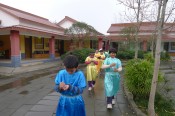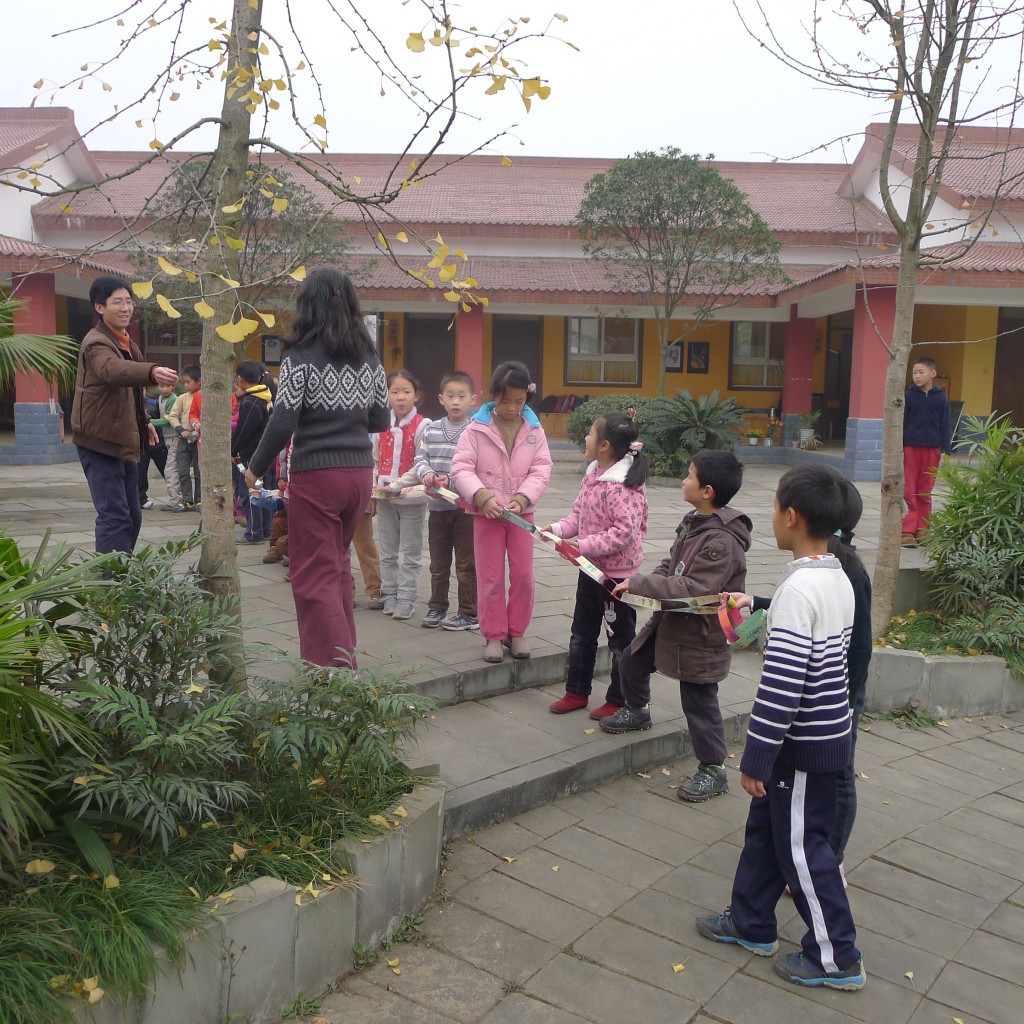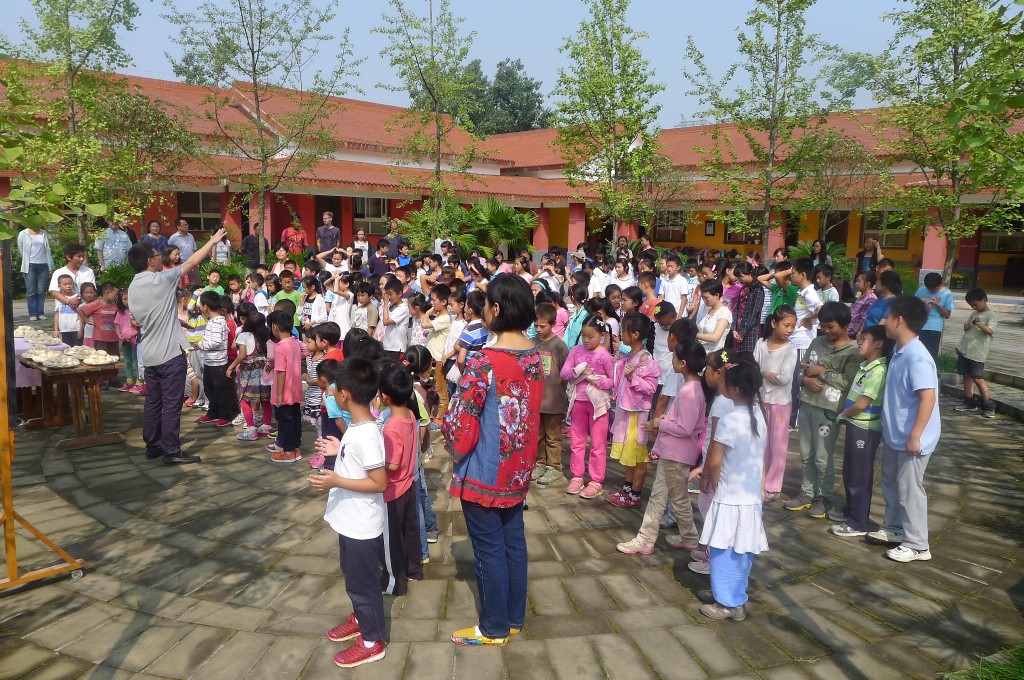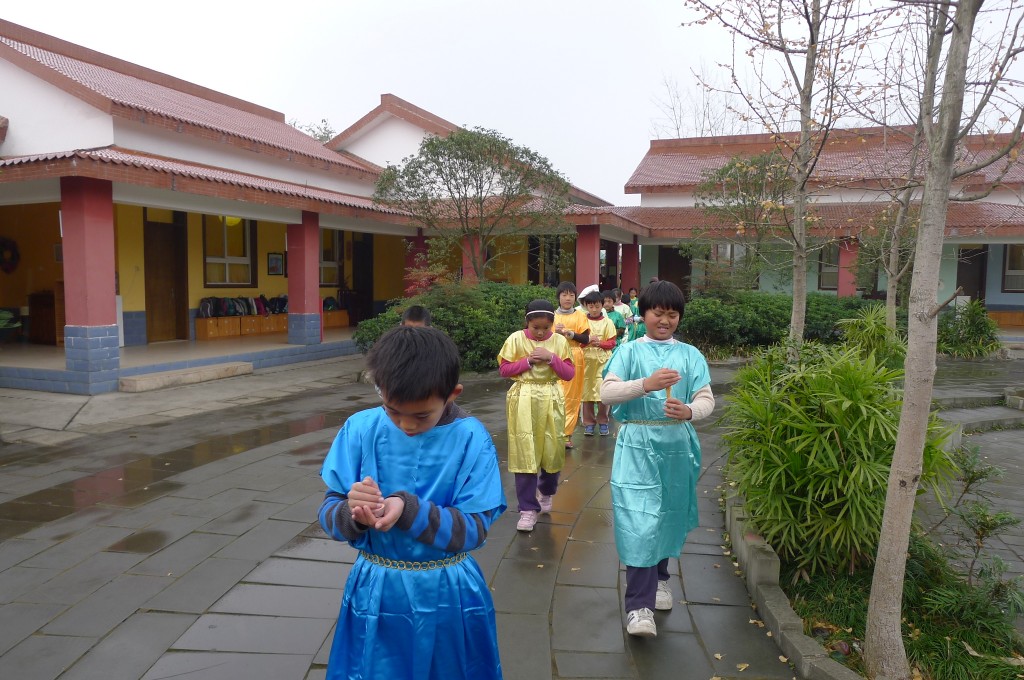Waldorf News
Resurgence in China

by Ben Cherry
Waldorf education is in its tenth year in Mainland China. The first school opened in Chengdu in September 2004 with five children in the kindergarten and a home school primary class for three of the teachers’ children. Now there are about 300 children and long waiting lists and the school is preparing to continue on into high school (grade 9) this September.
There are now thought to be more than 300 kindergartens and 36 grade school initiatives throughout China, basing their work on Waldorf education. Added to this are six 3-year part-time early childhood teacher training courses, five for primary school teachers and one for high school, along with courses in curative education, school administration, the arts and even a pioneer full-time teacher training course in Beijing.
What is the reason for this extraordinary development? And how can one ensure its quality?
One way of coming to an answer is to see it in the context of what is bubbling up in all aspects of life in China, in this time which the new president has called the Renaissance of the Chinese dream. For many, it is a time of optimism and exploration, as the country races to catch up with the standard of living in other prosperous countries. There is an energy in the land and the people, a feeling of almost unlimited possibilities.
One experiences the effects of this massive will for change in many ways. The earth is being dug up and transformed into concrete, expressways and high rise buildings at a rate that must be unprecedented in human history. Whole new cities are being created, high speed trains are being built throughout the country, and airports continuously expanding. It is rare to fly on a domestic flight that is not full and it is equally rare to take off on time because of the congestion. Meanwhile, traffic on the roads grows like water pouring into a dam; and people are leaving the countryside, seeking employment in the cities, often in the building sites or factories.
Socially, culturally, economically and physically, China is on the move. In most places, no sooner is an estate complete than it is integrated into a thriving community of shops, people and street life. The environmental consequences are immense, of course, as is becoming ever more apparent. Water pollution and the smog and dirt in the big cities are huge problems. It is like a dream that is wonderful, frightening and inexorable. For those who have money, there is a growing awareness of aesthetics in architecture and life-style, and a plethora of self-development courses. For those who do not, the future is bleak. The divide between the super-wealthy and the poor grows day by day.
One can ask how this – and the growth of an education movement which develops independent thinking – can be taking place within a political system that is still communist. Here one enters into the subtle intricacies of the way of thinking that has evolved through China’s long, dramatic history.

Though the West generally highlights the ruthless side of the government, it is also pragmatic and, because of its firm hold, can focus on the long term more than many other governments. Chinese people too are pragmatic. Generally they accept the way things are and get on with their lives. The essential attitude is one of free initiative – but beware the consequences if something goes wrong or someone complains to the government, for the penalties can be severe!
If it were not for this, Waldorf education could hardly have begun, for out of the 36 initiatives which are working hard to develop themselves, only two are recognised by their local or regional governments! In Australia or the West, such a situation could never occur, for the relationship with the law is very different. Through long experience people in China have developed the art of moving in the space between the legal and the illegal!
Several schools have been obliged by the government to leave their properties, and this has brought considerable hardship, but so far none has actually closed down. Water has many ways of reaching the sea, and the carriers of the schools too find different pathways for achieving their goals. In one situation the same police officer who supervised the expulsion of a school from one property later found them in another, not far away, and simply told them to obey the laws! In other situations parents or benefactors in high positions have ensured that a school is protected. Relationship is what counts, along with courage, creativity and an abiding faith in what one is doing.
Another example of this mobile way of thinking is that over the past two years Waldorf teachers, whether from legal or not-so-legal schools, have been invited to participate in the annual conferences of an organisation called New Education, which is led by a professor of education who is a senior member of the national government. Each conference is organised in conjunction with the local department of education. Two years ago I gave one of the keynote lectures, alongside professors from Japan and the United States representing other educational ideas. This year Christof Wiechert, previously from Dornach, gave an address, and both times a group of us gave workshops. Each time we were welcomed with generosity and gratitude.
From encounters such as these, it is clear that the central government is watching what is evolving in the Waldorf movement with interest – and, no doubt, caution. It is part of a wider research into educational methods worldwide, into which they are investing a lot of resources, for there is a growing discontent with the existing exam-oriented paradigm. In the public domain, meanwhile, on the internet and in magazines, there is a lot of discussion about Waldorf education, ranging from enthusiasm and gratitude to accusations of it being a religion.

China is forever a land of opposites. In some ways there is more openness to new ideas than in many Western countries, and a freshness in people’s attitudes; yet one walks on egg shells. There are people in influential positions in government, universities and business who recognise this education as a path into the future which accords with the aspirations of Chinese culture, but it is no less true that if the political leaders were to decide to close it down, it would be done immediately.
The most sensitive areas – and all foreign visitors who represent Anthroposophy or Waldorf education need to know this – are religion, politics, safety in schools and the infiltration of Western cultural values. One can speak about the spirit (though there are many ways of doing so) and there is a genuine wish in people to understand it, but one has to be very careful not to give the mistaken impression that Anthroposophy is a religion or a politically-oriented teaching. To do so would most likely bring about the closing of all the schools.
The fact that Chinese culture is based on philosophy rather than religion, however, provides a safe ground on which to work with Anthroposophy. It becomes a training in tact and in thinking and speaking exactly, and it is always a delight to discover resonances between the two streams of spiritual knowledge, ancient and modern. In my view, it is to a large extent this resonance which is at the basis of the growing interest, not only in Waldorf education, but Spiritual Science.
In a remarkable way, people’s encounter with Anthroposophy is also contributing to the growing longing in China to reconnect with what has been buried and almost forgotten on a cultural level. One could say perhaps that something is rising up spiritually from beneath the surface, just as in the cities the bulldozers, drills and cranes are raising up what is buried underneath the ground.
In a lecture he gave 102 years ago, the second in the series called Earthly and Cosmic Man, Rudolf Steiner spoke of how the time would come when ‘imprisoned Atlantean spirituality’ would rise up in China and amaze and shake the Western world, challenging the West’s sense of its own cultural and spiritual tasks. His attitude towards this resurgence of the power of a distant past is that we should meet it out of a spirit of mutual respect.
Often I have wondered whether what he was referring to has taken place already – in the diaspora of Buddhist monks who fled Tibet in the fifties of the last century, or in the cultural, social and ecological revolution of the sixties, which began in the United States. Inspirers of this back-to-nature movement were profoundly influenced by ancient Chinese writings, and for many in the West this and Tibetan Buddhism have become more potent sources of wisdom than Christianity.
It could be that this is what he was meaning; but something is nevertheless rising up in China now too and my experience is that many in the West (and the South) look upon it with amazement and fear. This time it is not only a cultural resurgence, but an economic and political one. It has power.
Rudolf Steiner also made another prediction. It was that if all that comes from the West to the East is materialism, the East will rise up against the West with a vengeance. What is happening now in the meeting of Anthroposophy with Chinese culture is very important. Anthroposophy, of course, is not the only fruit of Western culture to transcend materialism, but it is one of the few that unites spiritual revelation with clear, practical application in facing the problems of our world today.
The longing in China is not only for an education which recognises the fullness of humanity in ‘spirit, soul and body’ – or, to use the traditional Chinese way of expressing the same thing, ‘heaven, human being and earth’; it is also for ways of growing food, learning to work together and healing the environment, based on the same wholistic approach. The need for all aspects of the healing power of the anthroposophical way of seeing is urgent.
In all these areas, what is rising up culturally from the past can meet what Anthroposophy brings from the future. In both streams there is a sense of wholeness, and each activity and aspect is an expression of it. Both recognise the central importance of the human being and of the arts in all their forms, and in both there is a sense of how life itself can become an art.

This is the way of the ‘junzi’, which is so much at the heart of Chinese cultural aspirations. Traditionally the word has been translated into English as the ‘superior man’. I find it more appropriate to use Rudolf Steiner’s expression, ‘ethical individualism’ – or even the ‘becoming human being’. Through subtle correspondences such as this, these two great currents of world evolution can find a common pulse, and bring something fresh and new to birth.
I believe I can speak for others with whom I work in China in saying that this ideal works strongly in our will. Everything we do in the China Waldorf Forum, the network which takes on the task of trying to safeguard and enhance the quality of the Waldorf school movement in China and to keep the connection alive with Dornach and the outside world, is connected with this overall goal.
What is extraordinary is that the situation in China requires us to develop new ways in almost everything we do, for we have been advised that it would be politically unwise to set up a centralised association to control what is happening. Such respect as we in the coordinating group have from the schools comes, not from our position, but the relationships we form and the example we try to set of working together.
Much has been achieved, for example, by a grass-roots approach to creating curriculum appropriate for China. Research seminars, organised by members of the CWF working group, take place in different regions several times a year, focusing on different aspects of teaching. Each seminar is led by a group of more experienced Chinese teachers and all teachers from the region are invited to participate. This collaboration is then continued in meetings organised by the teachers themselves.
In the same spirit, our annual conference last summer had the theme of Diversity within Unity. What many participants discovered was that the magic key for the development of quality comes not from just following or obeying (though rules and expectations have their place), but from the realisation of one’s own inner source of self-change. It is through the ethical individual that creative change can come. The more clearly we unite in our ideals and goals, the more individual we can become in our ways of working towards them.
This is the inner task of the China Waldorf Forum and the reason why it is called a forum rather than an association. It has the potential of creating a space in which we can recognise the becoming human being in ourselves and each other, and from this centre of inner autonomy and responsibility go back to our work in our separate locations.
It is far from easy and it depends on many people with teaching experience and human-artistic quality working with us, but such is our goal. Most astonishing of all is the thought that the time may come when, through what Anthroposophy carries and what it illumines in Chinese culture, it can come to realisation on a much larger scale in society, as a new expression of the ancient culture, in forms and concepts appropriate to today.
Benjamin Cherry has been connected with the Waldorf movement in Mainland China since its birth (and pre-birth processes) ten and more years ago. Prior to that (and still now, where time allows) he worked with Waldorf schools and training centres in Thailand, Japan, Korea and Taiwan. He currently spends nine months of each year in the region and has been the Coordinator of the China Waldorf Forum since it was set up in September 2010 at a gathering of representatives from Chinese Waldorf schools, with the help of Claus-Peter Roeh from the Pedagogical Section in Dornach and Nana Goebel from the Friends of Rudolf Steiner’s Art of Education in Berlin. If you have experience to offer and wish to help, you can contact the forum at: cwforum@126.com

 Quality Education in the Heartland
Quality Education in the Heartland Flexible preparation for your new grade
Flexible preparation for your new grade Jamie York Books, Resources, Workshops
Jamie York Books, Resources, Workshops Roadmap to Literacy Books & Courses
Roadmap to Literacy Books & Courses Caring for All Stages of Life
Caring for All Stages of Life Waldorf-inspired Homeschool Curriculum
Waldorf-inspired Homeschool Curriculum The Journey is Everything
The Journey is Everything Space speaks. Its language is movement.
Space speaks. Its language is movement. Everything a Teacher Needs
Everything a Teacher Needs Bringing Love to Learning for a Lifetime
Bringing Love to Learning for a Lifetime Apply Today: New Cohort Starts Nov. 2025
Apply Today: New Cohort Starts Nov. 2025 Waldorf Training in Australia
Waldorf Training in Australia Association for a Healing Education
Association for a Healing Education Middle School Science With Roberto Trostli
Middle School Science With Roberto Trostli Train to Teach in Seattle
Train to Teach in Seattle Transforming Voices Worldwide
Transforming Voices Worldwide Bay Area Teacher Training
Bay Area Teacher Training Immersive Academics and Arts
Immersive Academics and Arts Full-Time Teacher Education
Full-Time Teacher Education Great books for Waldorf Teachers & Families
Great books for Waldorf Teachers & Families Summer Programs - Culminating Class Trips
Summer Programs - Culminating Class Trips
 ~ Ensoul Your World With Color ~
~ Ensoul Your World With Color ~ RSS Feeds
RSS Feeds